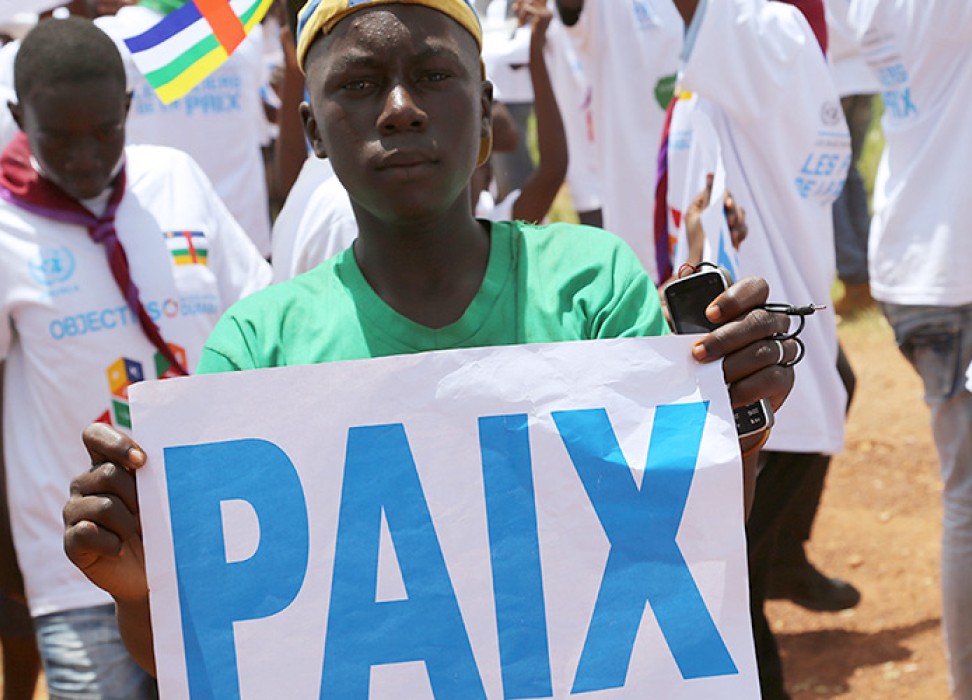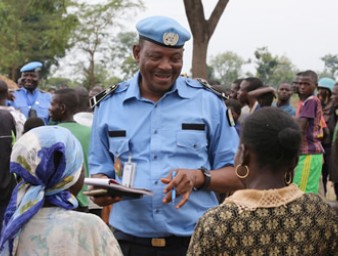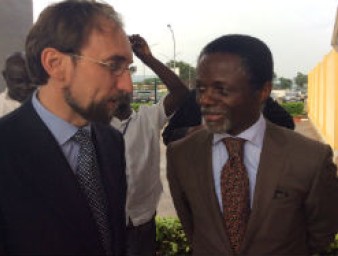Preventing incitement to hatred and violence in the Central African Republic
29 May 2019

In May 2017, the Human Rights Division of the UN Multidimensional Integrated Stabilization Mission in the Central African Republic (MINUSCA) started seeing an escalation of violence in the South-East of that country. Although in the past two decades the Central African Republic had been held hostage by numerous armed groups, the violence had spared the South-East region.
During incidents in Bangassou that same year, members of the Muslim community were forced into displacement after having been hunted down and killed by the so-called anti-balaka, a vigilante group of predominantly Christian faith. Survivors found refuge in the city’s cathedral.
Following those incidents, highly regarded leaders in that city and in other parts of the Central African Republic started making public statements inciting to hatred, discrimination, hostility and violence against the Muslim community. Those statements undermined initiatives taken to achieve peace and social cohesion in the Central African Republic.
"We realised that those messages were either the source of the violence, a trigger, or fuelled that violence once it had started," said Musa Gassama, the UN Human Rights representative at MINUSCA. "Not only were the armed group leaders capitalising on that tactic but political leaders as well, and it also contributed to profiling some communities."
Since then, the Mission has noted a resurgence of such messages after each major security incident. From April to December 2018 alone, 44 press articles were identified that contained calls to hatred, discrimination, hostility and violence involving 14 media outlets, both written and online.
"Hate messages that spread through traditional and online media have the particularity of causing physical and psychological violence on individuals or groups of individuals," said Gassama.
"The messages we analysed are essentially calls for national, racial or religious hatred, discrimination, hostility, violence, tribalism or xenophobia. At times, they are also used as an apologia for acts that could constitute genocide, war crimes and crimes against humanity, and negative religious and ethnic stereotypes."
The proliferation of hate messages is a major concern for the Human Rights Division as the violence they fuel gives rise to serious human rights abuses and restrictions on the enjoyment of all human rights by all communities. For Gassama, it has become clear that incitement to hatred is one of the drivers in the longstanding conflict in the Central African Republic.
To prevent further escalation, he said, it is important to detect early signs of that incitement and to engage the parties in the conflict, as well as the international community, in the response. Actions have been taken to condemn that discourse but, most importantly, to prevent their proliferation and to improve the enjoyment of human rights.
The Human Rights Division of MINUSCA produced an internal report on the capacities of key instigators to cause harm. Those findings were shared with the Mission’s leadership, the Expert Panel of the United Nations Security Council Sanction Committee on the Central African Republic, and the UN independent expert on the situation of human rights in the Central African Republic.
The Mission also mobilised responses at the global and national levels. The UN Human Rights chief issued a warning to the main instigators of the violence in Bangassou and the leaders of armed groups identified who were disrupting the peace process. Further, the UN Security Council Resolution 2399 established incitement to violence as a criterion for sanction. The Mission also carried out support, training, sensitization and mentoring activities on prevention and management of hate and violence discourse for national partners, including the High Council for Communication.
In addition, the Mission increased its monitoring and investigative capacities by establishing a working group with the various protection components of the Mission. It also formed partnerships with the UN Global Solutions Center for Technical Assistance and the Human Rights Investigative Lab of the University of California (Berkeley) for training on the appropriate tools to monitor online discourse.
MINUSCA recommends that the Government of the Central African Republic work on the implementation of the National Plan for the Prevention of Incitement to Hatred and Violence. This could be done through laws against hate speech.
The Mission also calls on civil society organizations to play a decisive role in promoting social cohesion by working with the Government.
29 May 2019



